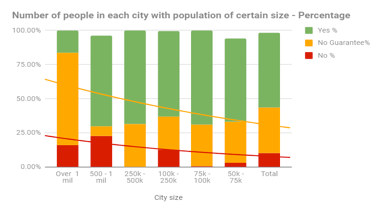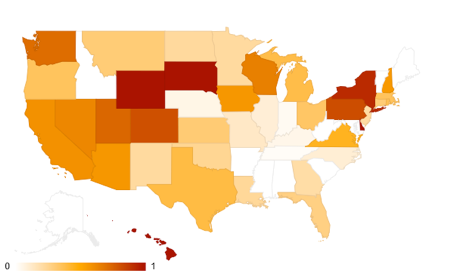
Deep Sentinel released findings that dispute a widespread notion that police respond to all home alarms.
The study conducted by Deep Sentinel Labs, the research arm of Deep Sentinel, looked at all the 765 U.S. cities with a population of around 50,000 or more (according to the US Census Bureau) and examined policies surrounding home security systems and subsequent police response, as well as the impact of false alarms.
Among the key findings:
- For more than 40 percent of residents living in U.S. cities with a population of around 50,000 or more, police will not respond or will not guarantee that they will respond to residential alarm calls.
- In America?s most populous cities with one million or more residents, nearly 80 percent have no guaranteed police coverage for their alarms. Police in these cities, ranging from New York City to San Jose, say they will not respond or cannot guarantee they will respond to these calls.
- 26 cities with a combined population of a combined population of 7,218,593 categorically will NOT respond to alarm calls. This represents 6 percent of the total 126 million people covered by the study.
10 Top No Alarm Response Cities
NO Response City Population
San Jose, CA 1,035,317
San Francisco, CA 884,363
Seattle, WA 724,745
Detroit, MI 673,104
Las Vegas, NV 641,676
Milwaukee, WI 595,351
Fremont, CA 234,962
Modesto, CA 214,221
Fontana, CA 211,815
Salt Lake City, UT 200,54 - Police response to home alarm calls varies across states. In the image below, states with lighter colors are more likely to respond to an event than those in deep red, where cities surveyed within that state will not respond or do not guarantee a response. To find out if police respond to alarm calls in your city, search the Deep Sentinel False Alarm database.
These findings dispel the myth that police rush to the scene when alarms sound from alarm companies such as ADT, Vivint, Protect America, SimpliSafe and others. This is in sharp contrast to focus groups and various consumer panelist surveys from Deep Sentinel that indicate that almost all consumers who have installed an alarm system believe that police will respond.
TOO MANY FALSE ALARMS
A key reason for the lack of police response to home security calls is due to false alarms. According to data from the Center from Problem Oriented Policing, police respond to more than 36 million alarm activations every year in the U.S., which costs an estimated $1.8 billion.
Most of these calls are false. Additional law enforcement agency research from Deep Sentinel Labs underscores this study, revealing that law enforcement agencies across the country say that 95 percent of alarm calls are false. As a result, they have stopped responding to alarms from alarm companies, finding them very costly and a drain on agency resources that could otherwise be used to address real offenses.
?After conducting preliminary surveys with law enforcement officers, agencies and consumers, we learned that police view alarm companies like most people view car alarms: they overwhelmingly believe that a majority of alarm calls they get will be bogus, with only one percent being the real deal,? said David Selinger, CEO and Founder of Deep Sentinel.
?We chose to dig a little deeper to get a broader view of the problem across America. Our data offers a better understanding of how false alarms affect homeowners who have installed alarm systems. They are living with a false sense of security in thinking that installing an alarm means that police will respond.?
Methodology
For the purposes of this study, Deep Sentinel Labs analyzed all U.S. cities with a population over 50,000 according to the 2017 U.S. Census Bureau. The populations of these cities range from 50,000 to 8.6 million, a study covering a total population of 126,000,000.
The analysis performed analyzed all city and local laws and policies governing how law enforcement responds to residential home alarm calls: local civic codes, city?s ordinances. Further, these legal restrictions were validated by contacting local police departments by phone. The result of this primary research was then tabulated and analyzed.
Deep Sentinel is a pioneer in AI-based home protection.
Source: deepsentinel.com


